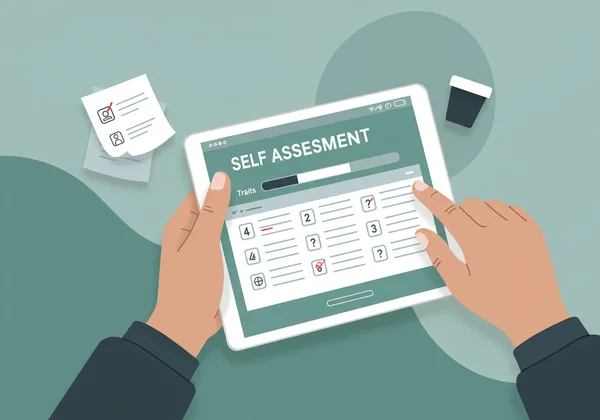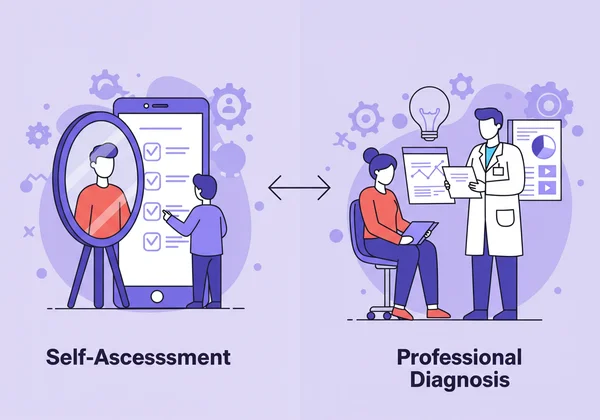Is Aspie Quiz a Diagnosis? Self-Assessment vs. Evaluation
July 21, 2025 | By Leo Sinclair
Have you recently completed an Aspie Quiz and now find yourself wondering what your results truly mean? That mix of curiosity and uncertainty is a common feeling for many taking this step in their self-exploration. This article is here to offer a clear, supportive, and honest answer.
Navigating the world of neurodiversity can feel complex, but you don't have to do it alone. Here, we'll carefully unpack the role of the Aspie Quiz as a powerful self-assessment tool. We will differentiate it from a professional evaluation and guide you on how to use your insights responsibly. Your journey of understanding is important, and it starts with having the right information. If you're ready to take the first step, you can begin your self-discovery at any time.
What is the Aspie Quiz: A Preliminary Self-Screening Tool
At its heart, the Aspie Quiz is designed to be a preliminary self-screening tool. Think of it as a structured mirror, reflecting patterns and traits you may or may not have recognized in yourself. It is not a test you pass or fail. Instead, it’s a private, accessible starting point for anyone curious about whether they might have traits associated with the Autism Spectrum (ASD), historically known as Asperger's Syndrome.
The quiz presents a series of questions based on established characteristics of neurodivergent experiences. By reflecting honestly on these questions, you can gain valuable insights into your own social preferences, communication styles, sensory sensitivities, and patterns of thinking. This process is the first step in making exploration easier and life richer, empowering you with knowledge.

The Purpose and Scope of Online Self-Assessments
It's important to understand the intended purpose of any online asperger's test. These tools are designed for introspection and education. They serve to organize your personal experiences into a coherent framework, providing language for feelings or behaviors you may have found difficult to describe. An asperger's self-assessment like this can be incredibly validating, helping you realize you are not alone in your experiences.
However, their scope is intentionally limited. They operate based on your self-reported information without the nuanced observation and contextual understanding of a trained clinician. They are an excellent resource for gathering personal data and identifying areas for further exploration, but they are not the final word.
Understanding Your Aspie Quiz Results Beyond a Score
When you receive your results from the quiz, it's tempting to focus solely on the numbers. But the real value lies in understanding the story they tell. Learning how to interpret Aspie quiz results is about looking at the profile of your Aspie and neurotypical traits. Which areas show strong alignment with neurodivergent characteristics? Where do you align more with neurotypical patterns?
Your results are a snapshot of your unique neurotype. For those seeking even deeper understanding, our optional AI autism report offers a comprehensive analysis. This personalized report goes beyond scores to provide insights into potential strengths, challenges, and how these traits might manifest in your daily life. It helps transform abstract scores into meaningful, actionable self-knowledge.

Self-Assessment vs. Professional Diagnosis: Key Differences
This is the most critical distinction to understand: a self-assessment vs diagnosis are two fundamentally different things. While a self-assessment can be an empowering part of your journey, it is not the same as a professional clinical evaluation. Recognizing these key differences ensures you use the tool correctly and take responsible next steps.
A self-test provides clues and a potential direction. A professional diagnosis provides a definitive clinical conclusion after a comprehensive and interactive process. Both can be valuable, but they serve different functions and hold different weights.

What Constitutes a Formal Autism Spectrum Disorder Diagnosis?
A formal autism spectrum disorder diagnosis is a comprehensive process, always conducted by qualified healthcare professionals like psychologists, psychiatrists, or neurologists. This multi-faceted evaluation typically involves several key components, such as:
- In-depth Interviews: Where professionals explore your developmental history from childhood to the present.
- Observational Assessments: Using standardized tools to observe your social interactions and communication.
- Information from Others: Sometimes, with your permission, input is gathered from family members or partners.
- Rule-Outs: Assessing for and ruling out other conditions that may present with similar traits.
This comprehensive approach ensures that the conclusion is based on a holistic view of you as an individual, not just on a set of self-reported answers.
Why Self-Tests Are Not Medical Diagnoses
Let's be clear: while the Aspie Quiz offers valuable insights, it is not a medical diagnosis. No online quiz can provide that. A quiz cannot understand your personal history, observe your non-verbal communication, or ask the nuanced follow-up questions a trained professional can. It lacks the clinical judgment necessary to distinguish between autism spectrum traits and those that might stem from other conditions like social anxiety, trauma, or ADHD.
Relying on a self-test as a definitive diagnosis can be misleading. Its true power lies in its ability to empower you with the insights and confidence to decide if seeking a professional autism evaluation is the right next step for you.
When to Consider a Professional Evaluation for ASD
After taking a preliminary ASD screening, you might wonder if you should take things further. The decision to seek a professional evaluation is deeply personal. For some, the insights from the quiz are enough for their journey of self-acceptance. For others, a formal diagnosis can provide clarity and unlock access to support.
This tool can act as a bridge. If your results resonate strongly with you and you feel that these traits significantly impact your daily life, pursuing a formal assessment may be a logical and beneficial next step.
Signs That May Warrant Further Assessment
If you are consistently facing challenges and your quiz results suggest a strong alignment with neurodivergent traits, it might be worth considering a formal evaluation. Think about whether you experience significant and persistent difficulties in areas such as:
- Building and maintaining social relationships.
- Navigating workplace or academic environments.
- Coping with sensory overload (lights, sounds, textures).
- Managing executive functions like organization and planning.
- Experiencing co-occurring anxiety or depression related to these challenges.
If these issues affect your quality of life, a professional opinion can provide clarity and direction.
The Benefits of a Formal Diagnosis and Support
For many adults, receiving a formal diagnosis is a profoundly validating experience. It can feel like finally getting an instruction manual for a brain that has always felt different. A formal diagnosis can bring several key benefits, including:
-
Self-Understanding: A framework to understand past difficulties and reframe them with compassion.
-
Access to Support: Eligibility for workplace accommodations, academic support, and therapeutic services tailored to autistic individuals.
-
Community: A stronger sense of belonging and connection with the neurodivergent community.
-
Improved Relationships: The ability to better explain your needs and communication style to loved ones.

Navigating Your Next Steps After the Aspie Quiz
Your journey doesn't end with a score. The Aspie Quiz is designed to be a beginning—a launchpad for deeper exploration. Whether you choose to seek a formal diagnosis or simply use the insights for personal growth, there are many ways to move forward.
The goal is to use this newfound information to enrich your life. This means understanding your strengths, developing strategies for your challenges, and connecting with resources that can help you thrive. You can always come back to our online tool to reflect on your journey over time.
Discussing Your Results with a Healthcare Provider
If you decide to seek a professional opinion, knowing how to discuss ASD with doctors can be helpful. You can bring a printout of your Aspie Quiz results, including the detailed score profile or your AI report. Frame it as a starting point for your conversation.
You could say something like, "I took this online screening tool to better understand some of my experiences, and the results resonated with me. I would like to explore the possibility of a formal evaluation." This provides a concrete basis for discussion and shows that you have engaged in thoughtful self-reflection.
Finding Support & Resources for Your Journey
Whether or not you pursue a diagnosis, connecting with community is invaluable. There are countless neurodivergent support groups online, such as subreddits like r/autism and r/aspergers, where you can share experiences and learn from others. Finding autism resources for adults can provide practical strategies for navigating daily life.
Exploring these communities can help you feel less isolated and more understood. You will discover a wealth of lived experience and find people who share your perspective, offering tips, validation, and a sense of belonging.
Your Journey of Self-Discovery Continues
So, is the Aspie Quiz a diagnosis? The clear answer is no; instead, it's a powerful tool for self-exploration. Its purpose is not to label you, but to empower you. It offers a private, insightful, and science-informed first step toward understanding your unique neurological makeup. It provides a lens through which you can view yourself with more clarity and compassion.
Your journey is your own. Use the insights from the quiz as a catalyst for growth, a guide for further research, or a starting point for a conversation with a professional. The path to self-understanding is a continuous one, and we are here to support you along the way. Start your journey today and see what you can discover about yourself.
Frequently Asked Questions About the Aspie Quiz and Diagnosis
Is the Aspie Quiz a diagnostic tool?
No, it is not. The Aspie Quiz is strictly a preliminary self-screening tool designed for personal exploration and insight. It cannot and should not be used as a substitute for a formal medical diagnosis from a qualified healthcare professional.
How accurate is the Aspie Quiz for self-assessment?
For self-assessment, it is a highly regarded tool. Its accuracy in providing a profile of traits depends on your honesty and self-awareness when answering. While it is based on established criteria, it is not a clinically validated diagnostic instrument and its results should be interpreted as a starting point for reflection, not a definitive conclusion.
What do my Aspie Quiz scores truly mean?
Your scores represent a profile of your traits. They indicate the degree to which your self-reported experiences align with common neurodivergent (Aspie) and neurotypical characteristics. The scores are best used not as a simple number, but as a map to understand your unique blend of traits and how they might influence your perceptions and interactions. For a deeper analysis, you can get preliminary insights with our optional AI report.
Where can I take the official Aspie Quiz online?
You can take the official aspie quiz for free on our secure and private platform. We are committed to providing a safe and supportive environment for your self-exploration, with multi-language support and a user-friendly interface to help you focus on your journey.